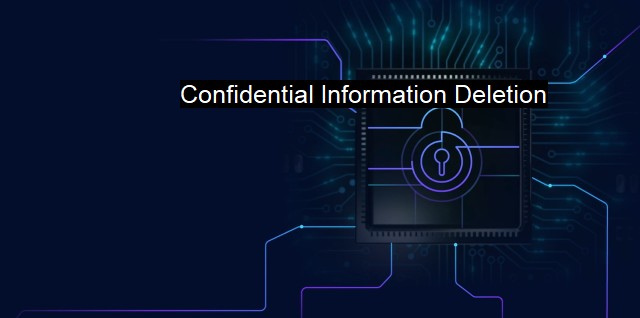What is Confidential Information Deletion?
The Importance of Confidential Information Deletion (CID) in Cybersecurity and Antivirus Programs to Protect Sensitive Data from Harmful Exploitation
Confidential information deletion refers to the removal or destruction of secret or private data in a way that it cannot be recovered, accessed, or used for unauthorized or malicious purposes. It ranks as one of the primary concerns in cybersecurity due its crucial role in protecting sensitive information and ensuring privacy.In broad terms, all types of information, ranging from organizational data to personal user details and financial transactions, can be earmarked as confidential. Therefore, secure deletion of this confidential information from storage media like databases, hard drives, or cloud storage becomes a necessity particularly in situations of system upgrade, decommissioning, or disposal to mitigate the risk of data breach.
It is a common belief that mere pressing of the 'delete' button permanently eliminates the file or data from the system; this is a misconception. When a file is 'deleted', only the reference to the file is removed from the file system table. the file still exists on the physical disk until it gets overwritten or physically destructed. Given this fact, technically savvy individuals or hackers could easily retrieve this information which can subsequently result into potential harm, especially in cases where the data is sensitive.
Confidential information deletion isn't just a 'good-to-have' practice but it's mandated by law in many regions globally. Various countries have implemented legislation and guidelines about how companies should handle and dispose of confidential information. the General Data Protection Regulation (GDPR) in Europe imposes stricter rules on how personal data is processed, stored, and deleted.
Effective confidential information deletion practices require a combination of technical and non-technical strategies. Technically, data deletion can be achieved through methods such as data masking, data wiping, cryptographic erasure, and physical destruction. Data Masking is a method of creating a similar but inauthentic version of an organization's data that can be used for purposes such as software testing and training. Data Wiping is a software based methodology to overwrite information to make it irretrievable. Cryptographic erasure employs the removal of the encryption keys of an encoded dataset, which renders the remaining information useless and unreadable. Physical Destruction of storage media, whilst effective, is considered environmentally unfriendly and may not be suitable for devices with stored information that is required to be preserved.
Nontechnically, companies must develop a robust data management and deletion policy. It must involve systematic identification, classification, storage, and eventually, secure disposal of different types of data. Employee training on adhering to these policies and the consequences of non-compliance is an integral part of the data deletion process, given that human error often plays a significant role in data breaches. It's also critical that businesses conduct regular audits and controls to ensure policy compliance.
In the context of antivirus systems, ensuring the safe deletion of confidential information is quintessential. Antivirus software often deals with valuable user information, making it a prime target for cybercri pers. Thus, these platforms must have robust, in-built data deletion mechanisms besides traditional antivirus functions. They win user trust not only by providing protection against digital threats but also by ensuring that collected personal data is deleted securely when it is no longer required, consequently mitigating risks related to data vulnerability.
Confidential information deletion is a critical area of cybersecurity that prevents unauthorized access to sensitive information and protects user privacy. While it is necessary to follow advanced and secure data deletion methodologies, the overall cybersecurity can be strengthened using good cyber hygiene practices such as secure file transfers, network security, secure disposal of paper files, regularly updated standard protocols, etc. As technology continues to develop, so too does the need for more enhanced and secure methods of confidential data deletion.

Confidential Information Deletion FAQs
What is confidential information deletion and why is it important in cybersecurity?
Confidential information deletion refers to the process of permanently removing confidential data from a device or system. This is important in cybersecurity because if confidential information is not properly deleted, it can remain on a device or system and be susceptible to data breaches or cyber attacks, which can compromise sensitive information.What are the methods of confidential information deletion in cybersecurity?
There are various methods of confidential information deletion in cybersecurity, such as data wiping, degaussing, and physical destruction. Data wiping involves overwriting sensitive data with random characters to make it unreadable, degaussing involves using a strong magnetic field to erase data, and physical destruction involves physically destroying the device or storage media.What are some precautions one should take before deleting confidential information in cybersecurity?
Before deleting confidential information in cybersecurity, it is important to back up any important data, ensure that the data is not subject to any legal requirements for retention, and verify that no other applications, processes or individuals will be affected by the deletion.Can antivirus software help with confidential information deletion in cybersecurity?
Yes, antivirus software can help with confidential information deletion in cybersecurity by enabling the user to securely erase confidential data, removing malware that may compromise sensitive information, and protecting devices from cyber threats that may result in data breaches.| | A | | | B | | | C | | | D | | | E | | | F | | | G | | | H | | | I | | | J | | | K | | | L | | | M | |
| | N | | | O | | | P | | | Q | | | R | | | S | | | T | | | U | | | V | | | W | | | X | | | Y | | | Z | |
| | 1 | | | 2 | | | 3 | | | 4 | | | 7 | | | 8 | | |||||||